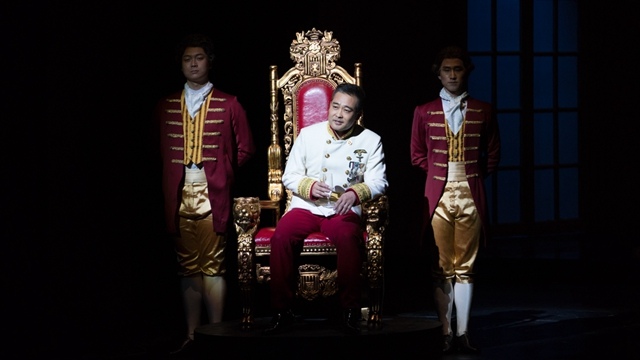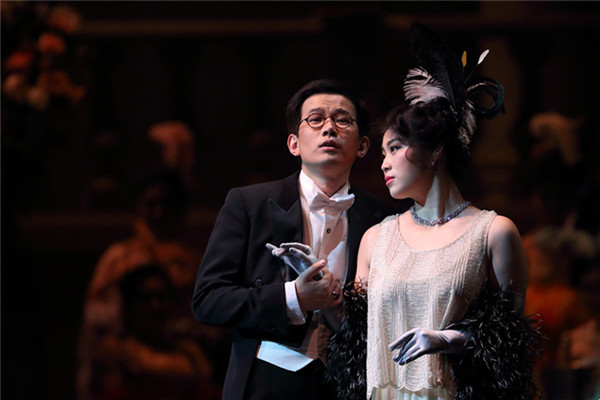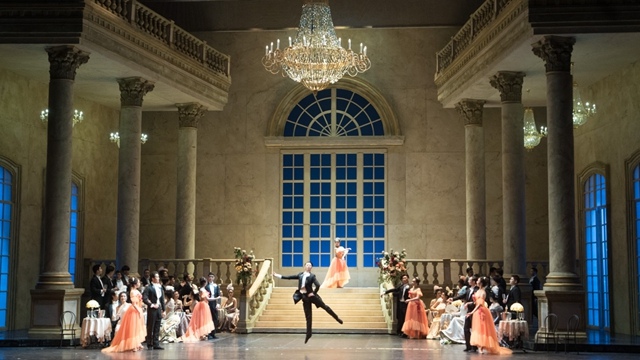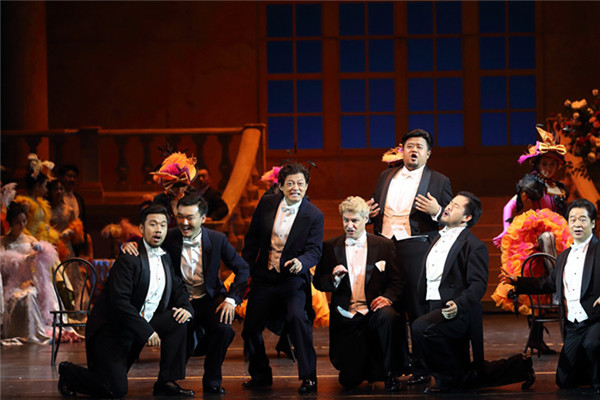Where will you see an opera singer dancing the can-can? Well, not in the high-brow version of the artform. But operetta? As part of its 2016 Opera Festival, China's National Centre for the Performing Arts gave us a rollicking good time Thursday with excerpts from 21 of the world's most famous operettas.
It's one big party on the stage, and with a Russian prince as host, of course the vodka was flowing.
Entitled "From Vienna to Paris: A Gala of Operettas", the NCPA event is set in the opulent world of 'Die Fledermaus', the operetta by Johann Strauss.
Playing the role of Prince Orlofsky, presenting each of the operettas in a storytelling format, CCTV host and occasional Culture-Express presenter, Ji Xiaojun!

Playing the role of Prince Orlofsky, presenting each of the operettas in a storytelling format, CCTV host and occasional Culture-Express presenter, Ji Xiaojun!
So what is operetta? The forerunner of the modern musical, for one thing. But also, according to Warren Mok - who has been described as one of the "Three Tenors of Asia" - it is also an opportunity for opera stars to let their hair down.
"Operetta - Operetta, I would say' is very similar to today's musicals. In the 19th century, it was developed from serious opera. Operetta is mostly comedies - I wouldn't say all of them - and very happy tunes, and lots of Waltz. Tonight, I need to dance as well, lots of Waltz and Can Can. So it's a very cheerful evening. And this kind of music, I think in China, the general public is not so familiar with. That's why we're doing the highlights of different operettas tonight...." said Mok.
Soprano Mila Song made her debut at NCPA in 2011, also in 'Die Fledermaus'. And that was the Center's very first operetta production.

Entitled "From Vienna to Paris: A Gala of Operettas", the NCPA event is set in the opulent world of 'Die Fledermaus', the operetta by Johann Strauss.
"Every singer, every opera singer very much enjoys it, relaxed to dance, happy to sing. And the audience is always to enjoy it with us, and on the stage it's like a big party, yeah," Song said.
Given the light-hearted or even frivolous themes of operetta, is the singer's preparation any easier?
Absolutely not, according to baritone soloist Paul Armin Edelmann.
"For sure not, no. Operetta is hard to sing, it's very demanding for the performers, because you have to act, actually like an actor, because you have a lot of dialogue too, and dancing and presenting. And the singing is also totally underrated. Very often they say, 'Oh, operetta's lighter, they're different singers' No! Actually in the big opera time, sixties and seventies, the best opera singers were all singing also operetta. Because it's very hard, the orchestra is very strong," Edelmann said.

Entitled "From Vienna to Paris: A Gala of Operettas", the NCPA event is set in the opulent world of 'Die Fledermaus', the operetta by Johann Strauss.
Tonight's selections encompass Italian, German, and French. And all international and Chinese soloists must be able to sing in these languages. But, as Mok explains, that should not be parrot-fashion.
"When you make an operetta career, you'd better know the language. If you don't know the language, it's very difficult to sing to really portray the character. And also, if you know the meaning, that really makes a difference. So we have great voices in China, but they lack language training and also cultural background. Many Chinese singers when they go abroad, they just excel because they know the culture and the language. And all of a sudden, boom!" Mok said.

Entitled "From Vienna to Paris: A Gala of Operettas", the NCPA event is set in the opulent world of 'Die Fledermaus', the operetta by Johann Strauss.
Mok's range is a tenor, but he'll do you a higher range as a party trick.
"Highest male voice is not really a tenor, it's a countertenor. Countertenor means like singing falsetto, like a woman's voice (demonstrates falsetto). That's called countertenor, but I'm a real tenor, okay?" she said.
But in the glass-shattering range, here's Song with a snatch from one of her arias.
Operetta was created to make people feel good centuries ago, and it's still working its magic. Here at the NCPA, the Chinese audience were lapping it up with a spoon!















